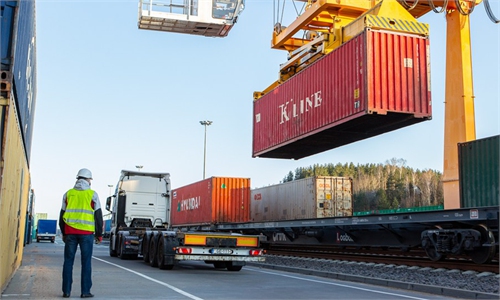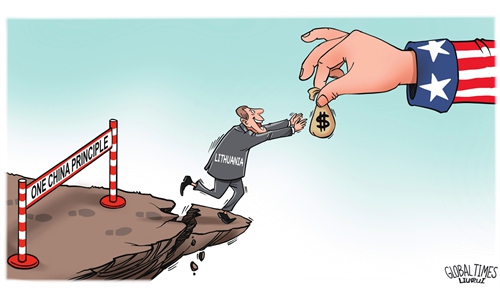
Illustration: Chen Xia/Global Times
Downgrading its diplomatic ties with Lithuania is one of China's countermeasures against the Baltic nation's provocations on the Taiwan question. But Lithuania should be more cautious about stirring up global geopolitics. If it goes too far, it will eventually be taught a lesson by global major power players.
On Sunday, Lithuania expressed regret over China's move but still defended its right to expand cooperation with Taiwan island, saying the office does not have "diplomatic status." If this is the case, then why are numerous Western mainstream media outlets all describing the office as the "de facto embassy?" Maybe Lithuania also has some persuasion work to do with its like-minded countries first before arguing with China.
Lithuania is so provocative over the matter. Why? Because of the hidden hand behind Lithuania, the US. Washington is the one who wishes to elevate the global status of the Taiwan island, such as making a breakthrough over the name of the island's offices.
Lithuania is a small country, far away from China. It is supposed to have nothing entangled within the Taiwan question. Yet after gaining benefits from the US, NATO and the EU by constantly provoking Russia, its turning itself into an anti-Russia front, Lithuania has gotten cocky, overwhelmed by self-confidence. And it has found its next target, China.
China has already alarmed a warning bell to Lithuania by recalling its ambassador. Presently, it has downgraded the diplomatic relationship to the level of charge d'affaires. If Vilnius refuses to learn any lessons, a breaking off of ties between the two countries cannot be excluded.
What will happen to Lithuania later? Some observers have portrayed a storyline. Apart from deteriorating ties with China, the country is also losing control in its fight against COVID-19. The US will hardly fulfill its oath. China-US tension will be relaxed gradually. Scandals over pro-US government puppets will be exposed. A new administration will come into office. It will correct its mistakes of the previous government. It will resume ties with China. And those may occur within two years.
These predictions make sense. But a more crucial blow for Lithuania to confront for its behaviors will come from geopolitical arena.
China-US relations have seen some signs of easing recently. Canada, Australia, Japan, some European countries and the hysterical anti-China hawks in these countries are observing. But Lithuanian keeps marching forward on its anti-China path. It tries to curry favor from the US to feed its sense of insecurity. It worries that after the US shifts its strategic focus to the Indo-Pacific, NATO may lessen its defense support to it.
Yet this is a wrong path which will lead to tremendous geopolitical waves. If diplomatic ties between China and Lithuania break down, relations between China and the EU will change fundamentally. The One-China principle carries significant weight in China-Europe relations. If Lithuania crosses the line too far, it will shake the foundation of major power relations. At that time, even the EU will lose patience to Lithuania.
Despite being a small country, Lithuania is positioned right between Europe and Russia. Its extreme Taiwan policy and anti-Russia maneuvers will jeopardize the balance between major powers. Europe will sooner or later be worried that what Lithuania does will bind Russia and China together into a tight embrace, breaking the current global geopolitical balance.
Besides, Lithuania overestimates itself. It wrongly believes a small country can play politics between major powers. Unfortunately, it is a pawn of the US at most. Provoking on internationally sensitive issues, including the Taiwan question, does no strategic good to Lithuania.
To some extent, Lithuania reminds people of North Macedonia, formerly Macedonia before February 2019. When Macedonia achieved independence, but was not yet mature with diplomacy and strategy, it was befuddled by the Taiwan island as the latter promised insignificant investments in the island. Macedonia established "diplomatic ties" with the Taiwan short-sightedly. Yet soon after, Macedonia faced the outbreak of a civil war, plunging the country into a poor and chaotic status.
Taiwan failed to deliver on its promises. Macedonia then tried hard to join the EU. Yet there is one precondition: the EU adheres to the one-China principle, which is the foundation of diplomatic relations with China. As a result, Macedonia severed its previous ties with Taiwan, joined the EU, resumed diplomatic relations with China. And cooperation with China helped bring quite a few development benefits to the country. If Lithuania wants to stay in the EU, it may learn the lesson from North Macedonia.
It has been proved many times that the US is not a reliable partner. If Lithuania offends China and Russia, its security environment will face more dangers. It won't take long before Lithuania realizes what it has done will harm its own interests, regional security and even global peace and development.
The article is compiled by Global Times reporter based on an interview with Sun Keqin, a research fellow at the China Institutes of Contemporary International Relations. opinion@globaltimes.com.cn



